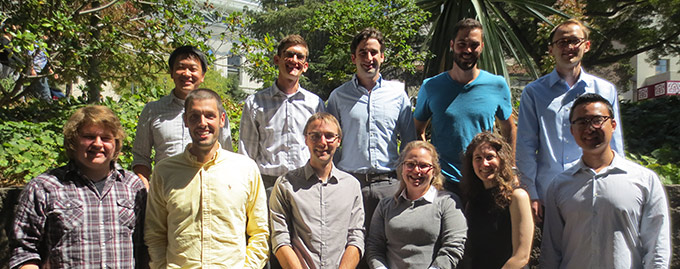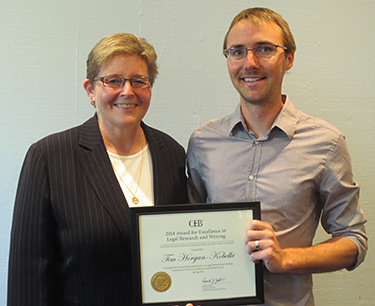
The Best Brief winners from each 2013-14 first-year skills section: (Back Row) Eric Chiang, Galen Ages, Jim Hurder, Ben Sinoff, Sean Howell; (Front Row) Gregory Kurzhals, Matt Rice, Tim Horgan-Kobelski, Lora Krsulich, Taylor Altman, Jonathan Ma; (Missing) Laura Smith
By Andrew Cohen
Tim Horgan-Kobelski ’16 has won the seventh annual Continuing Education of the Bar (CEB) Award for Excellence in Legal Research and Writing at Berkeley Law. CEB Executive Director Pam Jester announced Horgan-Kobelski as the winner at a luncheon ceremony and presented him with a framed certificate and a $2,500 check.
CEB is a joint committee of the University of California and the State Bar of California that provides practice guides, continuing education, and other professional resources to state bar members. It established the award to honor Berkeley Law students who demonstrate outstanding performance in the First Year Skills Program.
Like all first-year students at Berkeley Law, Horgan-Kobelski completed the Legal Research and Writing course during his fall semester. The course teaches students how to read cases, research legal problems, choose precedent, and write legal memoranda on topics involving state and federal law.
During the spring Written and Oral Advocacy (WOA) course, students learn more advanced research techniques and how to write a brief. After receiving a hypothetical case based on an emerging federal issue, students research the case law and write and submit competitive briefs; finalists revise their briefs based on instructor feedback and argue their position in a moot court setting.

Tim Horgan-Kobelski ’16
Horgan-Kobelski and 11 classmates became eligible for the award last spring after receiving Best Brief honors in their first-year WOA sections. The other Best Brief winners were: Galen Ages, Taylor Altman, Eric Chiang, Sean Howell, Jim Hurder, Gregory Kurzhals, Lora Krsulich, Jonathan Ma, James (Matt) Rice, Ben Sinoff, and Laura Smith.
“Tim was a fantastic student all year and he made the shift to persuasive writing in the spring look easy,” said Michelle Cole, his professor for both Legal Research and Writing and WOA. “His final brief was everything a legal brief should be: clear, concise, comprehensive, and very persuasive.”
At the award luncheon, First-Year Skills Program Director Lindsay Sturges Saffouri introduced the Best Brief winners. Niki Moore ’06, one of three award judges who reviewed the final briefs, hailed the quality of their legal analysis and writing. The CEO of 3+ Law Prep, Moore was joined on the selection committee by Alameda County Superior Court Judge Thomas Reardon ’88 and Clara Ruyan Martin of Cadence Law Group in Los Angeles.
This year’s case addressed whether a federal agency was allowed under the Freedom of Information Act to not disclose a videotape of its worksite before an accident there resulted in the deaths of four construction workers. Students argued whether the privacy interests of the workers’ family members outweighed the public’s interest in disclosure. Horgan-Kobelski wrote a brief on behalf of a public interest organization seeking the tape’s disclosure.
“Starting off the semester by looking at one of last year’s final briefs was a bit daunting, because at that point I didn’t fully understand the different components,” he said. “But our discussions in WOA highlighted each section’s purpose and utility for convincing the reader, which helped put the task of writing a persuasive brief in context. Throughout the writing process it was enjoyable to learn that, after identifying the relevant legal concepts, there remained room for creativity.”
Horgan-Kobelski appreciates that Berkeley Law’s first-year legal writing program “has found effective ways to have professors and teaching assistants give feedback on successive drafts of student work. Because writing is deeply connected to the legal profession, I think CEB’s support of the first-year program is very important, and I’m honored to have received this recognition.”